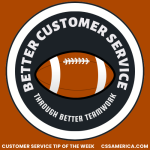Be a great teammate. Be a good team player. We’re all part of the team. We’re no longer employees, we’re team members!
The phrase “Team” is used in describing co-workers so much more than it was used years ago. Then, we would be talking about employees, talking about staff, talking about divisions or departments or agencies.
But today, we’re all asked to be part of a team. But what does that really mean, particularly in customer service?
Attitude and Empathy: Much of what goes into being a good teammate relates to the attitude that you bring. You’re part of a group dynamic with the others on your team. Try to convey an attitude of positivity rather than negativity or apathy. Talk about what you get to do as opposed to what you have to do. Consider the impact of your role or responsibilities on teammates by understanding their roles and responsibilities, their priorities. Bring empathy to your team.
Communication and Collaboration: Convey what you know, not hiding information to garner power. Work with others, not purely working in silos. Most issues in work – and to some extent in life – boil down to communication. And it’s easier to work toward a common goal if you communicate well and collaborate.
Actions and Accountability: With 11 players on a football field, a pro football coach often talks about how his players need to “do their 1/11th.” He means two things by this; first, don’t expect others to do your work for you. Make sure you’re pulling your weight. Second, try to get your job done before you wade too much into the waters of others’ responsibilities. If we try to do others’ jobs without trusting them to do theirs, there’s always a chance we don’t do ours well, and we could also alienate those teammates. Accountability? When you mess up, acknowledge, apologize, learn from it, and move on. We’re better teammates if we complement our responsibilities with our accountability.
Intentionally shift from employee to teammate.
Signup for FREE Tips! Contact Us More Resources for You Visit Our Home Page
























